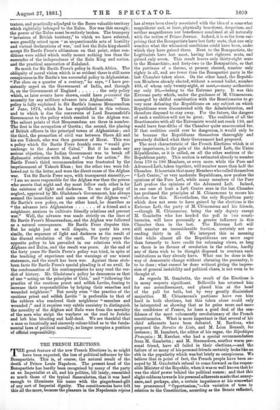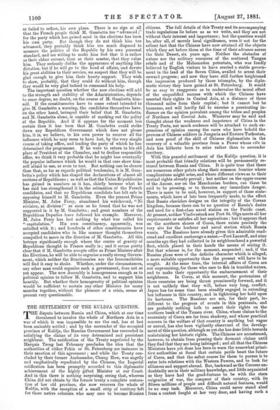THE FRENCH ELECTIONS. T HE great feature of the new French
Elections is, as might have been expected, the loss of political influence by the Bonapartists. This is, of course, the natural result of the death of Prince Louis Napoleon. The present head of the Bonapartists has hardly been recognised by many of the party as an Imperialist at all, and his politics, till lately, resembled so much those of the typical Sansculottes, that it was hard enough to illuminate his name with the gingerbread-gilt of any sort of Imperial dignity. The constituencies have felt this all the more, because the pleasure in the Napoleonic regime has always been closely associated with the idea of a somewhat magnificent and, at least, physically beneficent, despotism, and neither magnificence nor beneficence combined at all naturally with the notion of Prince Jerome. Indeed, it is so far from sur- prising that the Bonapartists have lost forty seats, that one only wonders what the whimsical conditions could have been, under which they have gained three. Next to the Bonapartists, the Legitimists have lost most, having lost eighteen seats, and gained only seven. This result leaves only thirty-eight seats to the Monarchists, and forty-two to the Bonapartists, so that the partisans of a throne, at present elected, number only eighty in all, and are fewer than the Bonapartist party in the last Chamber taken alone. On the other hand, the Republi- can Members already elected, without a second ballot, number 403, of whom only twenty-eight, at most,—many authorities say only 26,—belong to the Extreme party. It was this Extreme party which, under the guidance of M. Clemenceau, managed by skilful combination with the Reactionaries to go very near defeating the Republicans on any subject on which Republicans were discontented with the Administration, and therefore disposed to stay away. For the future, the dangers of such a coalition will not be great. The coalition of all the Reactionaries with all the Extremists would not reach 110, and would leave four-fifths of the Chamber quite unaccounted for. If that coalition could ever be dangerous, it would only be be because the Republicans themselves thoroughly and genuinely disliked what their Government had proposed.
The next characteristic of the French Elections which is of any importance, is the gain of the Advanced Left, the Union Republicaine, as it is called, on all the other sections of the Republican party. This section is estimated already to number from 170 to 180 Members, or even more, while the Pure and Advanced Left, taken together, will number more than half the Chamber. It is certain that many Members who called themselves "Left Centre," or very moderate Republicans, now profess the opinions of the Pure Left, while many members of the Pure Left profess the opinions of the Advanced Left. Indeed, in one case at least a Left Centre man in the last Chamber has professed the principles of M. Clemenceau to secure his election for this. Nevertheless, the only Republican party which does not seem to have gained by the elections is the Extreme Left, the party of M. Clemenceau and his friends, —though M. Clemenceau, being the only deputy except M. Gambetta who has headed the poll in two consti- tuencies, will have personally a greater influence in this Chamber than in the last. The Extreme Left will still number an inconsiderable fraction, certainly not ex- ceeding thirty in all. We interpret this as meaning that while almost all the Republicans are more eager than formerly to have credit for reforming views, so long as there is no flavour of revolution in the reform, hardly any of them wish to be thought disposed to overturn such institutions as they already have. What can be done in the way of democratic change without alarming the peasantry, is to be done ; what cannot be done without giving the impres- sion of general instability and political chaos, is not even to be thought of.
As regards M. Gambetta, the result of the Elections is in many respects significant. Belleville has returned him for one arrondissement, and placed him at the head of the poll for both, but by very greatly diminished majorities. M. Clemenceau's partisans have run him hard in both elections, but this taken alone could only be interpreted as showing that as he gains more and more the confidence of France, he loses a good deal of the oon- fidence of the most vehemently revolutionary of the French constituencies. What is more important is that several of his chief adherents have been defeated. M. Bardoux, who proposed the &rutin de Liste, and M. Leon Renault, for instance ; M. Isambert, the editor of his organ, the Republique Francaise ; M. Karcher, who had a special recommendation from M. Gambetta ; and M. Steenackers, another warm per- sonal friend, have all failed in their elections,—and the failure of so many of his personal friends certainly looks like an ebb in the popularity which was but lately so conspicuous. We believe that in point of fact, the French people have been an- noyed by M. Gambetta's refusal to come forward as the respon- sible Minister of the Republic, when it was so well known that he was the chief power behind the political scenes; and that this slight coldness towards his personal adherents marks that annoy- ance, and perhaps, also, a certain impatience at his somewhat too pronounced " Opportunism,"—his variation of tone in relation to the Constitution, according as the Senate reflected, or failed to reflect, his own plans. There is no sign at all that the French people think M. Gambetta too " advanced ;" for the party which has gained most in the elections has been his own party. But though they do not think him too advanced, they probably think him too much disposed to measure the politics of the Republic by his own personal standard, and are willing to make him feel that it is rather as their ablest servant, than as their master, that they value him. They seriously dislike the appearance of anything like dictation, but if he will go to the head of affairs, and devote his great abilities to their service, we suspect that they will be glad enough to give him their hearty support. They wish to show, probably, that they could do without him, though they would be very glad indeed to command his help.
The important question whether the new elections will add to the strength and stability of the Administration, depends to some degree, no doubt, on the course of M. Gambetta him- self. If the constituencies have to some extent intended to give M. Gambetta a warning, the candidates themselves have, on the other hand, betrayed their belief that M. Gambetta, and M. Gambetta alone, is capable of marking out the policy of the Republic. And if it appears for the moment less certain than it has been that M. Gambetta could strike down any Republican Government which does not please him, it is, we believe, in his own power to recover all the influence which he may seem to have lost, by the very simple course of taking office, and leading the party of which he has determined the programme. If he were to return to his old place of President of the Chamber, and to decline responsible office, we think it very probable that he might lose eventually the popular influence which he would in that case show him- self afraid to use, or even to test. But nothing can be clearer than that, so far as regards political tendencies, it is M. Gam- betta's policy which has shaped the declarations of almost all sections of Republicans ; as well as that the Union Republicaine has gained in numbers as it has, chiefly because what he has said has strengthened it in the estimation of the French candidates, and that no Republican candidate has felt safe in opposing himself to M. Gambetta. Even the present Prime Minister, M. Jules Ferry, abandoned his watchword, "Ni revision, ni division !" so soon as he found that he was not supported in it by M. Gambetta ; and great numbers of the Republican Deputies have followed his example. Moreover, M. Jules Ferry has lost nothing by what was called his " capitulation." His own constituency, apparently, was satisfied with it ; and hundreds of other constituencies have accepted candidates who in like manner thought themselves compelled to move in the direction of M. Gambetta. All this betrays significantly enough where the centre of gravity of Republican thought in France really is ; and it seems pretty clear that if M. Gambetta accepts office as Prime Minister after the Elections, he will be able to organise a really strong Govern- ment, which neither the Reactionaries nor the Irreconcilables will find it easy to shake. Whether, under the circumstances, any other man could organise such a government, does not as yet appear. The new Assembly is homogeneous enough as to political opinion to follow M. Gambetta, and to support him heartily. But whether their homogeneity of political opinion would be sufficient to sustain any other Minister for many months together, without the pleasure of a crisis, seems at present very questionable.































 Previous page
Previous page